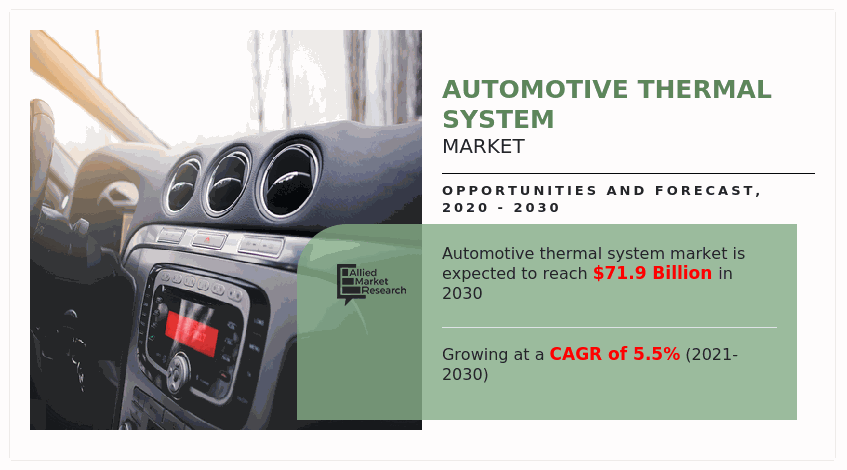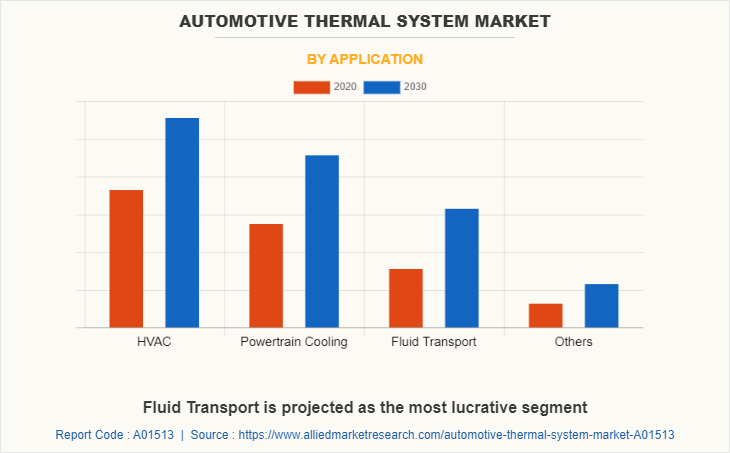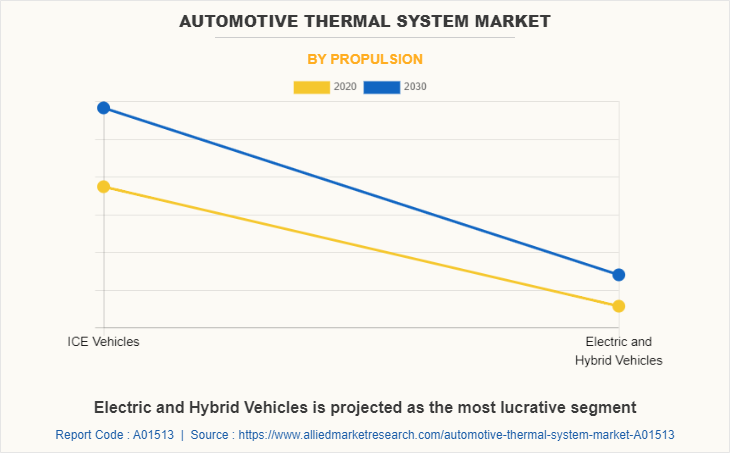Automotive Thermal System Market Research, 2030
The global automotive thermal system market was valued at $42.8 billion in 2020, and is projected to reach $71.9 billion by 2030, growing at a CAGR of 5.5% from 2021 to 2030.
Automotive thermal system monitors & maintains the temperature of key components of vehicles. It manages temperature of several components such as motor, battery, and cabin in vehicles to offer higher performance, enhanced fuel economy, and superior comfort. Efficient thermal management enables automotive components to operate in the optimum temperature range while also offering enhanced comfort in the vehicle interior through seat heating, front air conditioning, and rear air conditioning.

The growth of global automotive thermal system market is driven by greater demand for luxury vehicles with advanced features & comfort, implementation of stringent emission regulations, and integration of smart thermal management solutions into vehicles. However, high cost associated with automotive thermal systems and lack of standardization due to variation in emission regulations are the factors restraining the growth of the market. Conversely, surge in demand for electric vehicles, introduction of light weight HVAC solutions & ecofriendly refrigerants, and technological advancements are factors expected to offer growth opportunities during the forecast period.
The global automotive thermal system market is segmented into application, vehicle type, propulsion, and region. Depending on application, the market is classified into heating, ventilation, and air conditioning (HVAC); powertrain cooling; fluid transport; and others. The vehicle type segment includes passenger cars, light commercial vehicles, and heavy commercial vehicles. By propulsion, the market is segregated into ICE (internal combustion engine) vehicles and electric & hybrid vehicles. Region wise, the market is analyzed across North America, Europe, Asia-Pacific, and LAMEA.

Some leading companies profiled in the automotive thermal system market report comprise BorgWarner Inc., Continental AG, Dana Incorporated, Denso Corporation, Gentherm Incorporated, Grayson Thermal Systems, Hanon Systems, Mahle GmbH, Robert Bosch GmbH, and Valeo S.A.
Greater demand for luxury vehicles with advanced features & comfort
Luxury vehicles are equipped with high safety and advanced features. They are designed to offer comfort features such as heated and cooled comfortable seats, airbags, and heated steering. Increase in disposable income and improvements in living standards have led to greater demand for luxury vehicles. Manufacturers are integrating advanced thermal systems into luxury vehicles to improve performance and fuel efficiency, which, in turn, is expected to increase demand for automotive thermal system. Henceforth, increase in demand for luxury vehicles with advanced features & comfort is anticipated to propel growth of the global automotive thermal system market during the forecast period.

Implementation of stringent emission regulations
Automakers are already investing in electric vehicles to meet stringent emission regulations introduced by several governments across the globe. As automotive brands are introducing new electric vehicles to market, they need to address safety issues in terms of electric engine batteries. Thermal management systems in electric vehicles aid in keeping battery packs within optimal temperature range to improve engine efficiency as well as battery lifespan. Thus, enforcement of stringent emission regulations is a factor that is expected to contribute toward the growth of automotive thermal system industry.
Integration of smart thermal management solutions into vehicles
Thermal management system maintains the operating temperature of key components to reduce the risk of damage to components in vehicles. Manufacturers are integrating smart thermal solutions into new energy vehicles. Moreover, several manufacturers offer smart thermal solutions for automobiles. For instance, Johnson Electric offers thermal management solutions for battery, cabin heating, and power electronics. This integration of thermal management solutions into vehicles is expected to create demand for automotive thermal systems.

Key Benefits For Stakeholders
This report provides a quantitative analysis of the market segments, current trends, estimations, and dynamics of the automotive thermal system market analysis from 2020 to 2030 to identify the prevailing automotive thermal system market opportunities.
The market research is offered along with information related to key drivers, restraints, and opportunities.
Porter's five forces analysis highlights the potency of buyers and suppliers to enable stakeholders make profit-oriented business decisions and strengthen their supplier-buyer network.
In-depth analysis of the automotive thermal system market segmentation assists to determine the prevailing market opportunities.
Major countries in each region are mapped according to their revenue contribution to the global market.
Market player positioning facilitates benchmarking and provides a clear understanding of the present position of the market players.
The report includes the analysis of the regional as well as global automotive thermal system market trends, key players, market segments, application areas, and market growth strategies.
Automotive Thermal System Market Report Highlights
| Aspects | Details |
| By Application |
|
| By Vehicle Type |
|
| By Propulsion |
|
| By Region |
|
| Key Market Players | MAHLE GmbH, Robert Bosch GmbH, Hanon Systems, BorgWarner Inc., Gentherm Incorporated, Dana Incorporated, Denso Corporation, Valeo S.A., Continental AG, Grayson Thermal Systems |
Analyst Review
Growth of the automotive thermal system market is propelled by factors such greater demand of electric vehicles and integration of smart thermal management solutions into vehicles. There has been increasing focus on development of components such as electric compressor for electric & hybrid systems. In addition, manufacturers are introducing new solutions to cater to growing consumer demand. For instance, in August 2020, Lear Corporation and Gentherm Incorporated introduced newest solution in intelligent seating which is “INTU Thermal Comfort with ClimateSense” to provide optimized comfort inside cabin of vehicle.
Several developments have been carried out by key players operating in the automotive thermal system market industry. In August 2021, BorgWarner entered into a partnership with ZEEKR Intelligent Technology Co., Ltd. to supply its advanced high voltage coolant heater to ZEEKR’s new electric sedan. Moreover, in September 2021, Hanon Systems announced two site inaugurations in Hungary— a production facility in Pecs—and second is a building expansion in Retsag. The new manufacturing facility in Pecs will aid in increasing production capacity for fluid transport products.
Rise in demand for automotive thermal system from emerging economies such as Asia-Pacific coupled with increase in sales of electric vehicles in the region is expected to supplement the market growth. Collaborations and acquisitions are expected to enable the leading players to enhance their product portfolios and expand into different regions.
Automotive thermal system monitors & maintains the temperature of key components of vehicles. It manages temperature of several components such as motor, battery, and cabin in vehicles to offer higher performance, enhanced fuel economy, and superior comfort.
The sample/company profiles for global automotive thermal system market report can be obtained on demand from the AMR website. Also, the 24*7 chat support and direct call services are provided to procure the sample report.
The drivers for automotive thermal system include greater demand for luxury vehicles with advanced features & comfort, implementation of stringent emission regulations, and integration of smart thermal management solutions into vehicles.
The different applications of automotive thermal system include HVAC, powertrain cooling, fluid transport, and others.
The company profiles of the top market players of automotive thermal system industry can be obtained from the company profile section mentioned in the report. This section includes analysis of top ten player’s operating in the automotive thermal system industry.
Surge in demand for electric vehicles, introduction of light weight HVAC solutions & ecofriendly refrigerants, and technological advancements are factors expected to offer growth opportunities during the forecast period.
In August 2021, BorgWarner entered into a partnership with ZEEKR Intelligent Technology Co., Ltd. under which BorgWarner plans to supply its advanced High voltage coolant Heater to ZEEKR’s new ZEEKR 001 electric sedan. In November 2020, Dana Incorporated signed an agreement with Modine manufacturing company to acquire a portion of thermal management business of Modine Manufacturing company’s automotive segment.
The upcoming trends of automotive thermal system include development of advanced systems for electric $ hybrid vehicles, and integration of smart thermal management solutions into vehicles.
Some leading companies manufacturing automotive thermal system include BorgWarner Inc., Continental AG, Dana Incorporated, Denso Corporation, Gentherm Incorporated, Grayson Thermal Systems, Hanon Systems, Mahle GmbH, Robert Bosch GmbH, and Valeo S.A.
The global automotive thermal system market was valued at $42.8 billion in 2020, and is projected to reach $71.9 billion by 2030, growing at a CAGR of 5.5% from 2021 to 2030.
Loading Table Of Content...



